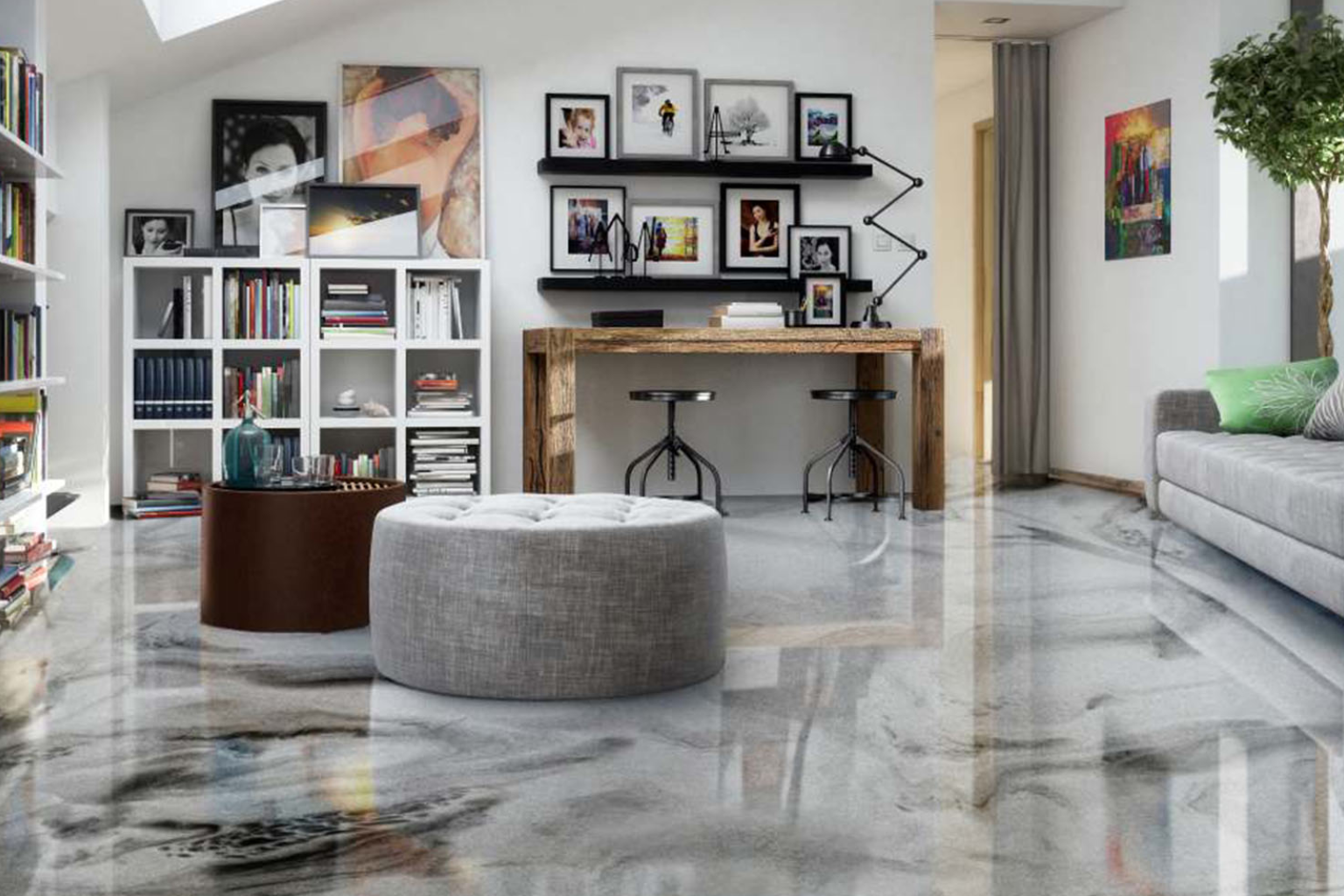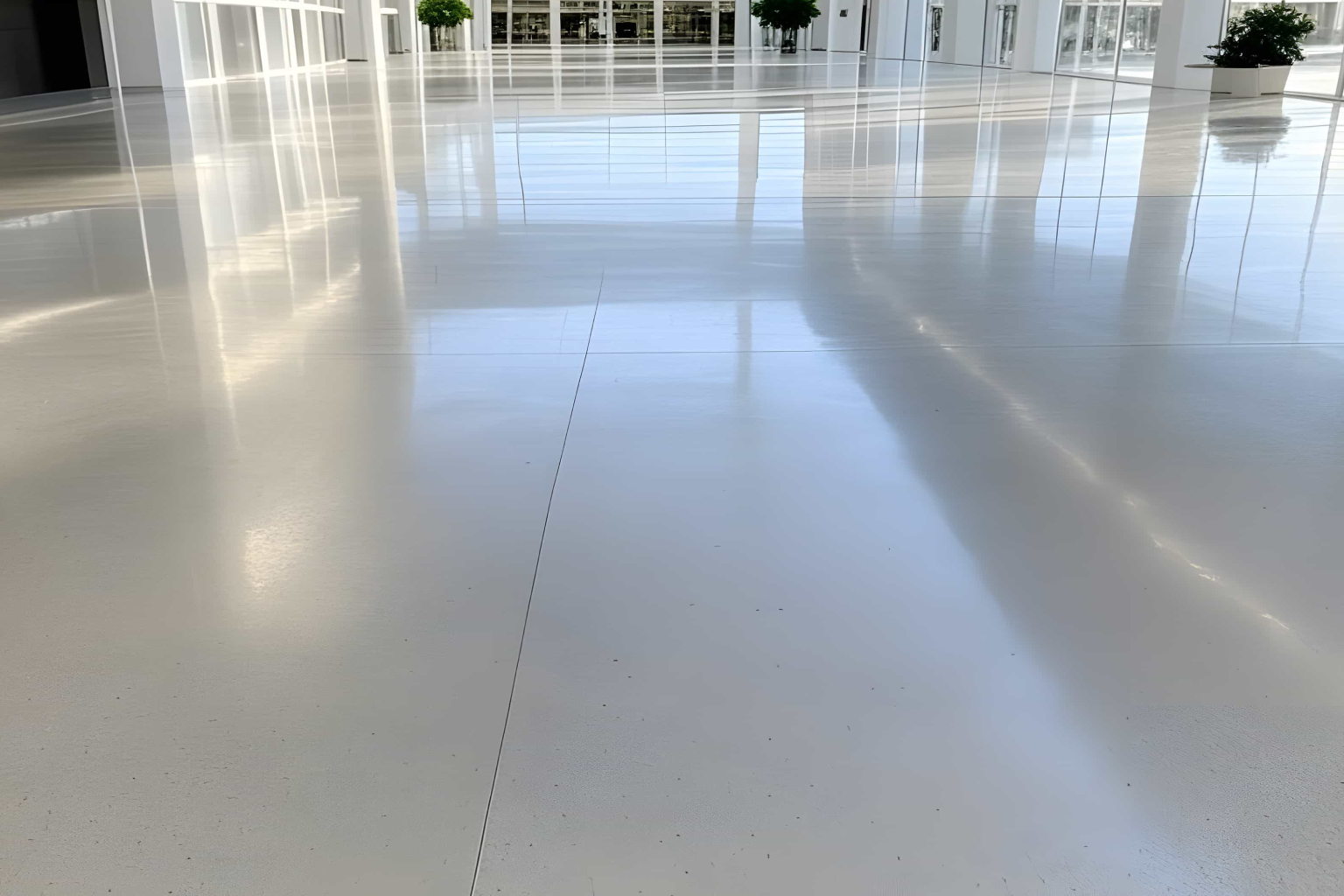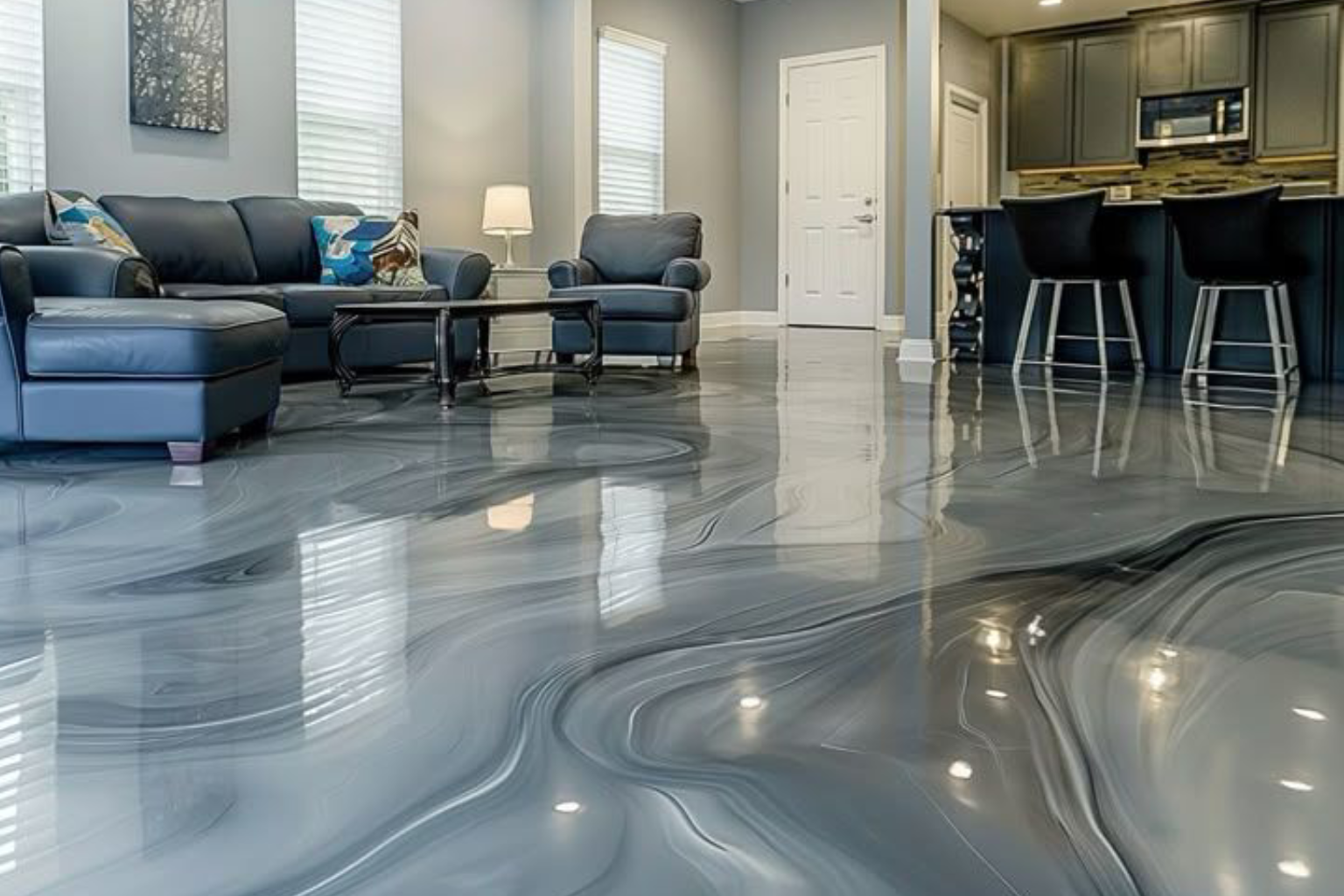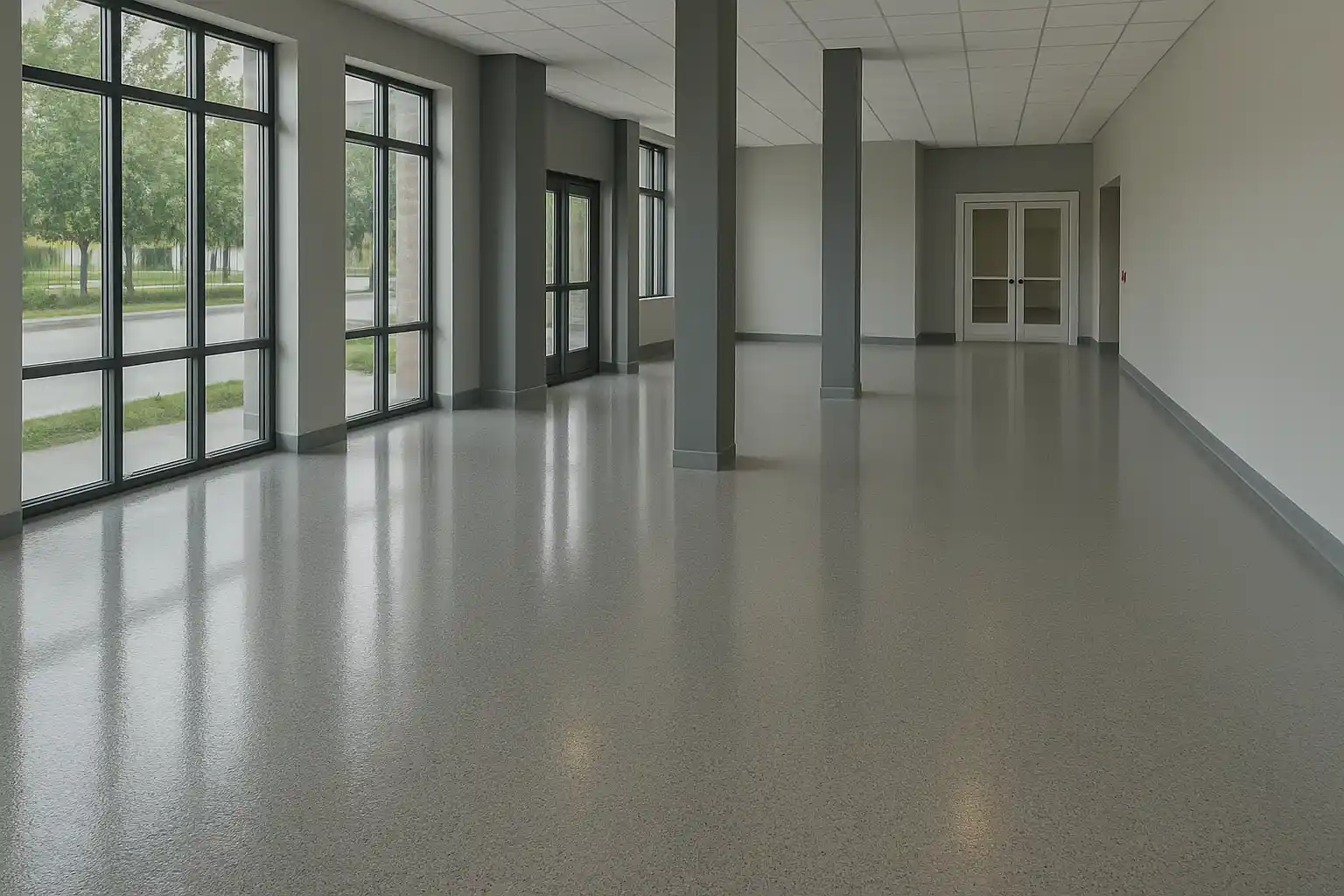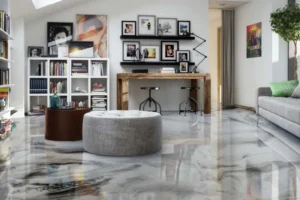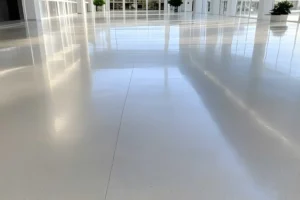Commercial flooring commands durability along with practicality. However, that doesn’t mean you have to trade off on your style. Epoxy flooring for commercial spaces has become among the most in-demand choices among business owners.
In fact, commercial epoxy flooring offers the ideal combination of toughness and amazing looks, whether you operate a bustling retail store or a healthcare facility. This blog is all about what you need to know about epoxy floors for businesses. We’ll walk you through its benefits, use cases, customization & more.
What is Commercial Epoxy Flooring?
Before we get to the benefits and applications, let’s understand what is epoxy flooring for commercial areas.
Commercial epoxy flooring is a seamless & durable floor coating. It forms by mixing epoxy resin with a hardening agent. After that, it is applied over the existing concrete. It forms a solid, glossy surface when cured.
Epoxy can resist chemicals, moisture & impact. Epoxy commercial flooring can withstand a wide range of conditions, from light foot traffic to heavy machinery. Therefore, it’s an ideal option for both beauty and functional purposes. It’s generally used in environments such as:
- Hospitals & clinics
- Retail stores & shopping centers
- Restaurants & commercial kitchens
- Warehouses & industrial plants
- Office buildings & showrooms
Benefits of Epoxy Floors for Businesses
Epoxy stands out as a smart choice for commercial areas when comparing flooring options. Let’s have a look at some of its incredible benefits:
1. Unmatched Durability
Commercial epoxy floor coating offers outstanding resilience. Durable floors mean that they stand up to constant foot traffic, forklifts & other commercial activity without cracking or even fading.
2. Low Maintenance Needs
Epoxy is non-porous and seamless. The low-maintenance epoxy floors mean that the spills and dust stay on the surface. Therefore, you don’t have to do deep cleaning every other day. You also don’t need to polish or do frequent repairs. So, you can save both time and operational costs this way.
3. Safety and Compliance
Many businesses choose epoxy flooring because of its slip-resistant nature. Moreover, it abides by health & safety standards. You can also add nti-slip finishes during installation to increase their grip even more. It’s specifically great when the floor gets wet or greasy.
4. Aesthetic Customization
Your floors are a mirror of your brand. Epoxy flooring business solutions offer a great range of customizations. You can select your own colors, finishes & even embedded logos. This showcases your visual branding and interior style.
5. Chemical and Spill Resistance
Epoxy commercial flooring offers superior resistance for businesses that deal with chemicals or cleaning agents. In fact, it won’t stain or degrade like traditional tile or vinyl might. This makes it ideal for auto repair shops and manufacturing plants. Moreover, you can use it in laboratories and medical facilities
6. Budget-Friendly Investment
No doubt, the initial cost of epoxy commercial flooring may seem higher than vinyl or tile. However, the reduced repairs and replacements make epoxy a smart investment in the long run.
How Epoxy Flooring Supports Your Business

Is Epoxy Flooring a Good Business? Yes, it is! Epoxy flooring is a fantastic choice for commercial building spaces, and an exciting business opportunity as well. Epoxy flooring is becoming a sought-after option for office buildings, warehouses, and retail spaces.
As a result, more contractors and business owners are picking it up as a service they can offer that people want. Because of the low cost of materials, longevity, and quick turnarounds, epoxy flooring is one of the best trades someone can be involved in the renovation sector.
How Epoxy Floors Support Your Business:
- Boosts Brand Perception: Clean & glossy floors give a sense of professionalism.
- Minimizes Downtime: Faster epoxy floor installation compared to tile or polished concrete.
- Reduces Maintenance Costs: A simple mop routine keeps the floor looking brand new.
- Long-Term Value: Floors that last over a decade without major upkeep.
Customization Ideas for Businesses
Epoxy flooring doesn’t just serve a functional purpose. In fact, it also allows you to creatively express your brand identity, enhance workflow, and even improve safety. Below are some impactful epoxy flooring business customization options that can elevate your commercial space.
Color Zoning for Safety or Workflow Designations
Color-coded zones are more than just a visual look. In fact, they have a functional value. You can use different colors in factories and hospitals. This defines your walkways, restricted areas, or safety paths.
Color zoning transforms your epoxy flooring for office buildings into a visual map, which guides both employees and visitors efficiently. You can also streamline your movement and abide by OSHA to improve overall workplace safety. For example:
- Green pathways for pedestrian-only routes
- Yellow for caution zones
- Red for danger or restricted areas
Embedded Logos or Graphics
Why stop at walls and signage? Your floor is prime real estate for branding. In fact, epoxy flooring has become a marketing tool that reinforces your business identity by using embedded company logos or graphics.
These designs are sealed beneath a clear coat, whether it’s your logo at the main entrance or branded patterns in customer-facing areas. This is specifically impactful for showrooms and Corporate lobbies.
Metallic Swirls for Luxury Appeal
Prefer lustrous looks for your business place? Metallic epoxy flooring uses shining pigments to form three-dimensional swirls. These swirls give the look of marble or polished stone.
Epoxy flooring for business is perfect for luxurious boutiques and hotel lobbies in case you want to leave a memorable impression. In fact, each metallic design is highly unique. Hence, your floor will never be duplicated elsewhere.
Glow-in-the-Dark Pathways for Emergency Exits
Now you can use photoluminescent additives in your epoxy floor to build glow-in-the-dark pathways. They remain visible even during power outages.
These are specifically useful in large buildings or entertainment venues since visibility is an important factor in those places. In fact, you can use them to:
- Outline emergency exit routes
- Highlight stairways or ramp edges
- Mark hazardous zones in dimly lit areas
Matte Textures for a Modern Look
Glossy isn’t for everyone. Therefore, matte epoxy finishes offer a softer and more refined look for modern or industrial-themed areas. These finishes reduce glare and hide scuff marks. This gives your business a clean look. It’s specifically true when you pair them with neutral tones such as charcoal or sand. Matte epoxy works well in tech offices and creative studios.
Commercial Epoxy Flooring Applications
Various types of epoxy flooring are commonly installed in commercial areas. Let’s explore some of its applications.
- Retail Stores: Epoxy flooring for retail stores gives a modern look that attracts customers. It also manages high foot traffic at the same time.
- Warehouses & Industrial Plants: It’s a great choice for intensive environments because of its durability and impact tolerance.
- Medical & Dental Offices: Epoxy abides by the strict sanitary needs of healthcare areas since it’s highly hygienic.
- Restaurants & Commercial Kitchens: Waterproof and easy to sanitize. It’s perfect for areas with food safety concerns.
- Commercial Garages: Industrial-quality garage epoxy protects your commercial area from constant spills and heavy impact.
- Office Buildings: Office buildings use decorative epoxy finishes to give your floor a professional look and showcase their brand image.
Maintenance Tips for Commercial Epoxy Floors
Care of commercial epoxy flooring is easy and inexpensive. It will keep its luster, safety, and long-lasting characteristics with regular maintenance.
- Clean spills immediately. Wipe up oil, chemicals, or water before they can leave a stain or damage the surface of your epoxy flooring. This is especially important with office or warehouse epoxy flooring, where spills are common.
- Use a soft mop or scrubber. Steer clear of abrasive brushes or cleaners. These can leave your commercial epoxy flooring looking glassy and dull.
- Sweep daily. Remove dust and debris to maintain a clean and professional look in epoxy flooring for offices, showrooms, or retail spaces.
- Reapply protective coating. Reapplying every few years will help retain the durability and shine of your commercial epoxy flooring.
- Do not drag large or heavy objects. When you need to move something heavy, always lift or use pads. Dragging or sliding will scratch your epoxy flooring, especially in offices or commercial areas.
With little effort, your commercial epoxy flooring will stay looking new for years. It will keep your workspace clean, stylish, and professional.
Final Thoughts: A Smart Choice for Smart Businesses
First impressions and functionality matter more than ever in today’s competitive world. Epoxy floors for businesses aren’t just durable and practical. In fact, you can present a polished & forward-thinking brand to your customers and staff with them.
Epoxy flooring has it all, whether you’re redesigning a space or building from scratch. You get economical and outstanding looks with epoxy for high-traffic areas. Hence, commercial epoxy flooring is a smart and strategic move for business owners who want a long-lasting flooring option.
FAQs About Commercial Epoxy Flooring
How durable is epoxy flooring for business?
Epoxy floors are extremely durable because they can work for almost 10–20 years. It stays in the same condition even with heavy commercial use.
Is epoxy flooring suitable for commercial and business use?
Epoxy flooring is great for all types of commercial settings, whether it’s retail or industrial, because of its durability and visual flexibility.
What is the cost of epoxy flooring for commercial spaces?
The average commercial epoxy flooring cost per square foot falls between $4–$10. However, it generally relies on the scope and type of coating system.
How long does epoxy flooring last in commercial buildings?
Epoxy flooring can last for a minimum of 10–20 years in commercial environments when you give it proper care.
Is epoxy flooring slippery in commercial areas?
Epoxy can be made slip-resistant by using additives. It’s a safe option when professionals install it with appropriate finishes.
Can epoxy flooring be customized for brand aesthetics?
Epoxy offers full customization, ranging from colors, finishes, embedded graphics, and more. So, you can match your business branding.
How long does it take to install commercial epoxy flooring?
Most installations take somewhere between 2 to 5 days. Furthermore, we’ve fast-curing formulas if you’ve to deal with tighter schedules.



